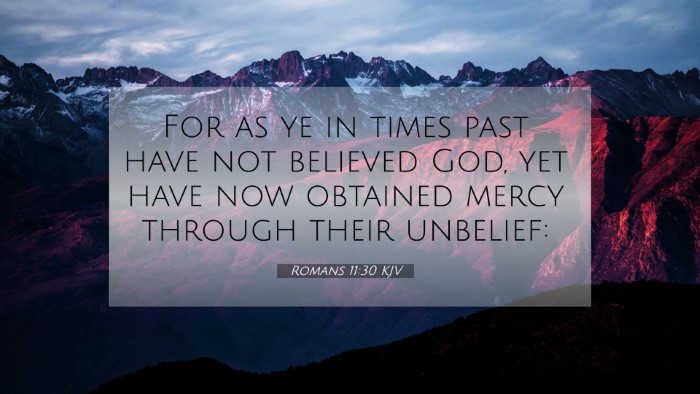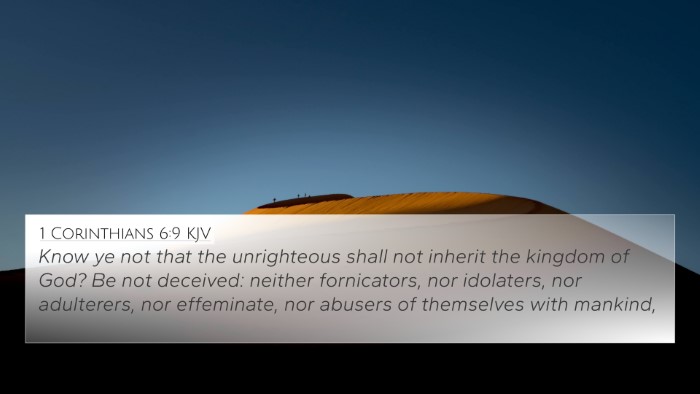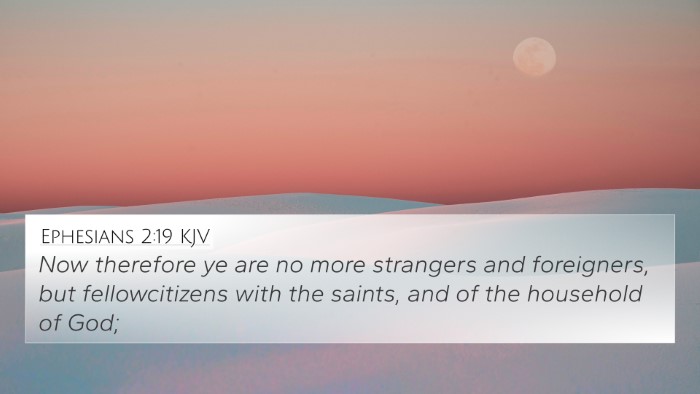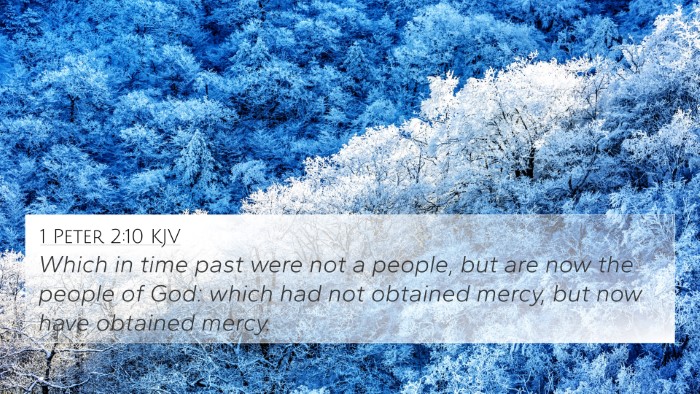Understanding Romans 11:30
Bible Verse: Romans 11:30 - "For as ye in times past have not believed God, yet have now obtained mercy through their unbelief."
Overview of Romans 11:30
The verse encapsulates a powerful theological concept regarding mercy and faith. It illustrates the transition from disbelief to belief and highlights how God's mercy is extended to those who once did not believe.
Interpretation from Public Domain Commentaries
This section synthesizes insights from renowned commentaries by Matthew Henry, Albert Barnes, and Adam Clarke.
Matthew Henry's Commentary
Henry emphasizes the idea of mercy and the redemptive plan of God. He indicates that the unbelief of the Gentiles led to their eventual reception of mercy, showing that God’s grace can turn around the consequences of human unbelief.
Albert Barnes' Commentary
Barnes focuses on the contrast between the past unbelief of the Gentiles and their current state of grace. He points out that the unbelief of some has turned into an opportunity for mercy for others, particularly the Gentiles, highlighting the interconnectedness of accepting and rejecting faith.
Adam Clarke's Commentary
Clarke explains the implications of receiving mercy for those who once stood outside of faith. He argues that this verse serves as a reminder of God's unwavering love and the possibility of redemption through belief, showcasing the depth of divine mercy.
Thematic Connections with Other Bible Verses
This verse can be cross-referenced with several other scriptural texts that discuss themes of mercy, unbelief, and redemption:
- Romans 5:8: "But God commendeth his love toward us, in that, while we were yet sinners, Christ died for us."
- Ephesians 2:4-5: "But God, who is rich in mercy, for his great love wherewith he loved us, even when we were dead in sins, hath quickened us together with Christ..."
- 1 Timothy 1:13: "Who was before a blasphemer, and a persecutor, and injurious: but I obtained mercy, because I did it ignorantly in unbelief."
- Acts 26:18: "To open their eyes, and to turn them from darkness to light, and from the power of Satan unto God, that they may receive forgiveness of sins..."
- Hebrews 4:16: "Let us therefore come boldly unto the throne of grace, that we may obtain mercy..."
- John 3:16: "For God so loved the world, that he gave his only begotten Son, that whosoever believeth in him should not perish, but have everlasting life."
- Luke 15:10: "Likewise, I say unto you, there is joy in the presence of the angels of God over one sinner that repenteth."
Connections between Bible Verses
Romans 11:30 provides a foundational understanding that can be linked to other verses in the New Testament that share the themes of mercy, grace, and redemption:
- Romans 9:23-24: Discusses God’s mercy towards vessels of mercy prepared for glory.
- Romans 3:23-24: All have sinned, but are justified freely by His grace through redemption.
- 2 Corinthians 5:17: In Christ, we are new creations, emphasizing renewal.
Bible Study Methods and Tools for Cross-Referencing
To deepen one’s understanding of Romans 11:30, one can utilize various tools and methods:
- Bible Concordance: A comprehensive index that helps locate themes and verses.
- Cross-Reference Bible Guide: A resource that connects related verses for thematic studies.
- Chain Reference System: Following linked verses leads to a broader understanding of biblical themes.
- Comparative Study of Pauline Epistles: Analyzing Romans alongside other letters of Paul reveals common themes and theological links.
Conclusion
Romans 11:30 serves as a profound reminder of the transition from unbelief to belief and the encompassing mercy of God. By utilizing tools for Bible cross-referencing and exploring inter-Biblical dialogue, believers can grasp the full implications of God's grace and mercy as presented throughout scripture.
This verse not only connects the Old and New Testaments but also provides a rich thematic basis for understanding the nature of God’s love for humanity, encouraging believers to explore further the intricate connections woven throughout the Scriptures.













